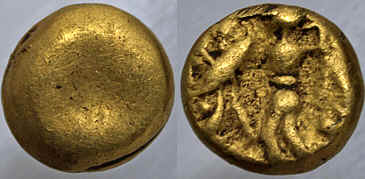

| Type munt | 1/24 Gold Stater | Omschrift voorzijde | Muntconditie | fraai | |
| Provincie | Omschrift keerzijde | Datum | 8 juli 2007 | ||
| Muntplaats | Voorzijde | Verkoper | geniusantiques | ||
| Jaartal | 2e eeuw BC | Keerzijde | Athena Alkis | Bedrag | US $355,00 (EUR 256,67) |
| Vorst | Vindplaats | Veiling | ebay | ||
| Metaal | Schatvondst | ||||
| Oplage | Literatuur referentie | Paulsen Taf. 7. 140ff | |||
| Gewicht | 0,3 gram (opgave verkoper) | ||||
| Diameter | 4,79mm (opgave verkoper) | ||||
| Soortelijke massa |
Boii (a Latin plural) is the Roman name of an ancient Celtic tribe, living in Transalpine Gaul (modern France) and Cisalpine Gaul (northern Italy), and later in Pannonia (today Western Hungary), Bohemia, Moravia and western Slovakia. The European region of Bohemia owes its name to the Boii, via old German Boia-haim- = "home[land] of the Boii".
Another reference to Boii is dated sometime between 100 and 44 BC, when Julius Caesar refers to the Boii in his work about Gallic Wars, Commentarii de Bello Gallico. written c. 50 BC:
They persuade the Rauraci, and the Tulingi, and the Latobrigi, their neighbours, to adopt the same plan, and after burning down their towns and villages, to set out with them: and they admit to their party and unite to themselves as confederates the Boii, who had dwelt on the other side of the Rhine, and had crossed over into the Norican territory, and assaulted Noreia.
It seems quite clear that Caesar here refers to the historic Cimbrian War of c. 115 - 101 BC, during which the Cimbri and Teutones attacked the Roman frontier. The Cimbri were led by the king Boiorix whose name means "King of the Boii". Thus it appears we are dealing with a confederation of the Cimbri and Boii led by the Boii King as over lord. That the Boii survived until the time of Caesar (50 years after the Cimbrian War) indicates that, perhaps, the Roman propaganda of their crushing defeat against the barbarians may be overstated. The inferred motive is clear: Roman propaganda would not allow the barbarians to inflict two crushing defeats on their forces without returning the favor.
Sometime between 59 BC and AD 17, in volume 21 of his work Ab Urbe Condita, Livy says that it was a Boian man that offered to show Hannibal the way across the Alps.
When, after the action had thus occurred, his own men returned to each general, Scipio could adopt no fixed plan of proceeding, except that he should form his measures from the plans and undertakings of the enemy: and Hannibal, uncertain whether he should pursue the march he had commenced into Italy, or fight with the Roman army which had first presented itself, the arrival of ambassadors from the Boii, and of a petty prince called Magalus, diverted from an immediate engagement; who, declaring that they would be the guides of his journey and the companions of his dangers, gave it as their opinion, that Italy ought to be attacked with the entire force of the war, his strength having been nowhere previously impaired.
During these events, many Boii likely became slaves of the Romans, and their name may have come in some area to mean "slave".
Some members of the Boyer family believe that their name (as well as Bayer, Bowyer, and others) reflects descent from the Boii.